How celebs use social media for fundraising
This is one of the 18 ideas presented to an audience of 250 fundraisers on February 21 2019 at the annual I Wish I’d Thought of That (IWITOT) celebration of inspirational fundraising ideas. This one pays tribute to the use of Twitter by famous or influential people to drive engagement and income for UK charities.
- Written by
- Joel Voysey
- Added
- September 26, 2019

Twitter has become rather an angry place with highly partisan politics on both sides of the Atlantic and a tendency by some Twitter users to use the channel purely for arguing about anything and everything.
These campaigns celebrate what has made Twitter so much fun, particularly in its early years, and have used the significant traction and interest that they have generated for social good.
UK comedian Richard Herring had, for a number of years, been spending the whole of March 8th each year on Twitter letting men – who were complaining bitterly about the injustice of women ‘getting their own day’- know that there is an International Men’s Day every year – on November 19th. As well as having some fun at the expense of these angry men, Richard posted a link to a JustGiving page he had set up to raise funds for domestic abuse charity, Refuge, in order to support women and children who had suffered violence at the hands of the men in their lives. This page went on to raise just over £150,000 in 2018 from more than 10,000 donors.
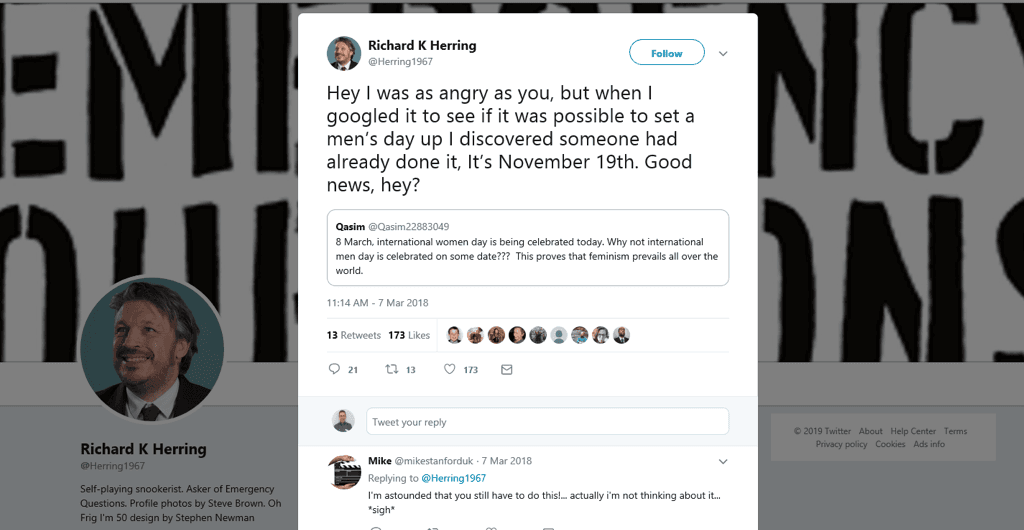
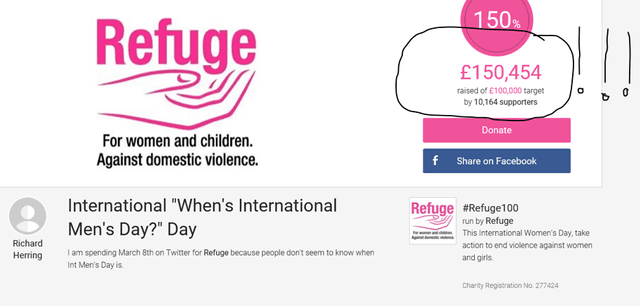 View original image
View original image
From Richard Herring’s JustGiving story:
‘Every International Women's Day, (March 8th) for a few years now I have gone on Twitter to search for people asking, "When's International Men's Day?" to let them know that that is on November 19th. Weirdly most of them only seem to care about this on International Women's Day and when November 19th comes along they do nothing. I think some of them think that there wouldn't be an International Men's Day. But there is one. It's on November 19th.
I do this so that everyone else can get on with celebrating International Women's Day and using it to raise awareness of the issues that affect women. And trying to achieve equality.
Just like the men who ask when International Men's Day is could do on International Men's Day for men, but generally don't.’
In the second case, Rhodri Marsden (musician, author and eminent Tweeter) decided on Christmas Eve in 2011 to share a photo of his single bed back at his mum and dad’s house and to encourage others to do likewise. Over the next seven years, hundreds of people have done exactly that, and Rhodri has shared these – often quite unusual - sleeping arrangements with his more than 50,000 followers. Two years ago, Shelter approached Rhodri and suggested that there may be a good opportunity to ask Twitter users to reflect on the 320,000 people across the UK who do not have settled accommodation at all, never mind just at Christmas. In 2018, Twitter also got involved and started promoting Rhodri’s annual festive tweet-along, and the Shelter tie-in. The activity raised £5,000, and was a good way of bringing the issue of homelessness to a wider audience in a new and different way.

Dara Nasr, Twitter’s managing director, said:
"The ‘#DuvetKnowItsChristmas' meme has also been something of a phenomenon, covered by the media, and there is even a book. It would be great this year if we could use its power to bring people together to do some good, as not everyone has a home at Christmas, which is why we’re delighted to have partnered with Shelter.’
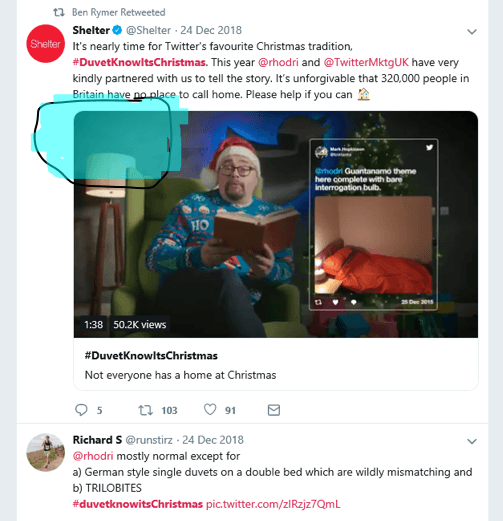
The final example is of Richard Osman, the TV presenter and executive, who had been using Twitter polls to find out people’s favourite things in particular categories (films, chocolate bars, Christmas singles etc). Like each of the examples in this SOFII exhibit, Richard did not expect participation in his Twitter polls to be nearly as high as it was – more than two million people voted in one of his early polls! This kind of engagement caught the attention of BetFair, a UK bookmaker who offered to run a book on the outcome of the poll and donate all losing bets to Childs-i Foundation. In 2016, this amounted to £7,500 for bets taken on the World Cup of Crisps poll, supplemented by more than £6,000 on Richard’s JustGiving page. Betfair have continued to support the initiative and Richard, with 763,000 Twitter followers, now runs a similar poll every 6 months, raising funds for Child-i Foundation.
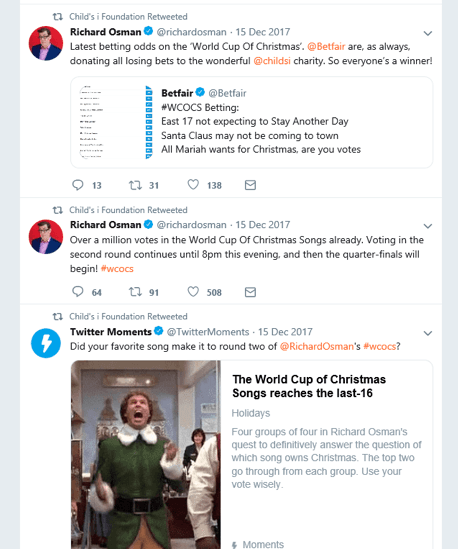
Richard’s latest project is an interactive book, The World Cup Of Everything, in which he takes categories such as animals, Christmas songs, crisps and British sitcoms, and whittles them down until he has a winner for each.
‘I did the first one when I was 12, just for my own amusement. I’ve always been fascinated by polling and statistics.
I love the idea of people arguing for four days about chocolate – it’s so British and charming.
More recently I did it on Twitter. I thought it would take 10 minutes of my time, but the first one garnered two million votes and betting companies got involved, so now I do one every six months and raise money for a charity I’m involved in, Childs i Foundation.’
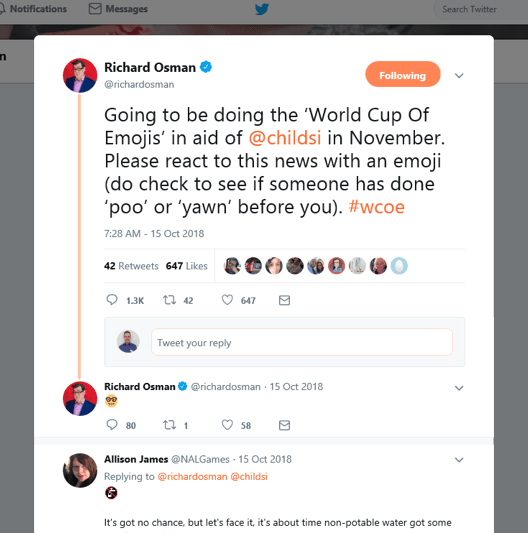
This represents a new way of engaging with social media and celebrities or people with significant reach in these channels. The charities themselves were not the originators of these campaigns, and that meant that the resource expended on the activity was minimal and amounted to little more than some social media support and monitoring. The charities did do very well to encourage, thank and engage both their celebrity ambassadors and those giving to their cause, many for the first time.
What makes these winning campaigns?
- Content, content, content – each one of these is now a social media institution!
- Charities have stayed out of the way largely but have managed the relationship warmly from just off stage and they have pivoted to gain the benefit.
- Funny… really funny. Can you be that funny? Really?
- The good that we do creates a wonderful virtuous circle. It’s daft, it’s childish, it’s funny – and then some good comes of it.
- They are ALL happening again.
- They have ALL brought key ambassadors closer to the causes and to the charities.
To sum up, charities probably can’t be the instigators of magic Twitter moments like these…
….but how they respond is everything.

















